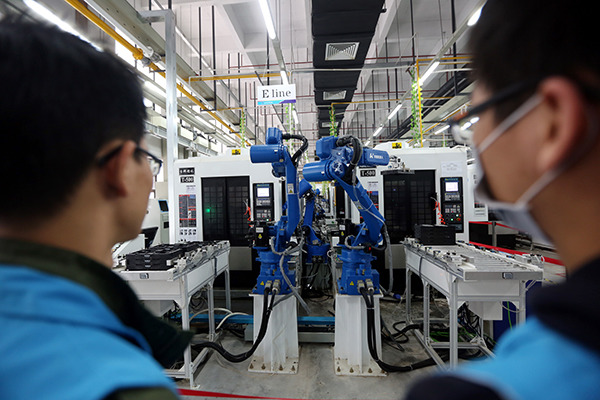
Two workers inspect a production line equipped with robots in Dongguan. (Photo/China Daily)
About 500 factories shut down or went bankrupt in Dongguan in 2015, but the number of newly registered enterprises in the city was "three times" as much as the number of those that closed, according to Xu.
"So, there was not a wave of factory closures or capital flight in Dongguan, given that the city witnessed more new foreign contracts signed in 2015," said Xu, adding that the city's new foreign investment reached $5.3 billion last year.
Since China embarked on reform and opening up in the late 1970s, foreign investors from more than 40 countries and regions have been attracted to Dongguan, once an important agricultural area in Guangdong province.
According to the local government, 11,000 foreign-funded enterprises have operations in the city, with utilized foreign capital reaching nearly $80 billion.
"Dongguan remains a powerful economic engine, partly fueled by industrial upgrading and the introduction of more advanced businesses," said Xu.
According to the local government, Dongguan's economy grew 8 percent year-on-year to 628 billion yuan in 2015, outpacing the national average of 6.9 percent.
"Innovation-driven industries are playing a bigger role in promoting the growth of the local economy as there is a rising number of technology companies in the city," said Xu.
In addition to the development of e-commerce and the introduction of smart equipment and foreign investment with advanced technology, Dongguan also aims to upgrade various businesses in its townships by boosting innovation and technology.
For example, the government of Hengli township, which is home to around 1,000 industrial mould manufacturers, has launched an innovation project with initial investment of around 205 million yuan to help upgrade local business.
Dongguan, in the heart of the Pearl River Delta, has 32 townships and districts, with each strongly focusing on a specified manufacturing sector such as electronic components, shoes, furniture, garments or mobile phones.
The Hengli project, in cooperation with tertiary education institutions, such as Shanghai Jiaotong University, has become a major platform connecting traditional mould-making processes with innovative technologies such as 3D printing.
Taking the innovation-driven approach, the project aims to push the mould production value to 20 billion yuan by 2018, according to the local government.
Since the project was launched in 2012, several sub-platforms including a mould testing technology center and a mould industrial park and professional associations including a 3D printing union and a machinery tooling society have been set up in Hengli.
Powered by the project, the township's mould industrial output value grew from 4.6 billion yuan in 2011 to 8.5 billion yuan in 2014, according to the government.
The local government provided free office space to innovative companies such as Dongguan Sprintray 3D Printing Co, whose MoonRay printer has become a big hit in the global market.
"The advanced 3D printing technology will help increase production efficiency once it is well connected with the traditional mould business," said Tang Yaoke, deputy general manager of Dongguan Sprintray.
The 3D printing company, which was set up in 2013 by a number graduates who had been educated overseas, has developed direct business relationship with more than 30 local mould enterprises, according to Tang.
"The 3D printing technologies are able to provide specified services for local mould manufacturing," said Tang.
According to Chen Xiwen, Party chief of Hengli, the township's GDP grew 10.9 percent year-on-year in 2015, thanks to innovative technologies being introduced to the local mould business.
"The township was once home to hundreds of original equipment manufacturers in the mould business in the 1990s, with lower production efficiency and higher energy consumption. But now it is becoming an innovative center for high-end moulds," said Chen.
Hengli has now developed 14 national-level high-tech enterprises since 2012 and two national-level mould laboratory centers.
"A growing number of mould enterprises have increased investment in research and development, thanks to strong need to upgrade their business," said Chen.
The township's investment in mould technology research and development grew from 56.5 million yuan in 2011 to 190 million yuan in 2014, according to Chen.


















































